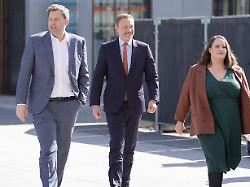Coalition Committee at Illner
“It was a productive discussion”
By Marko Schlichting
3/31/2023 5:51 am
After the marathon meeting of the coalition committee, the criticism of the results did not stop. It is obvious that the compromise paper contains some unreasonable demands – especially for the Greens. In the case of Maybrit Illner, however, the party chairmen of the traffic light partners do not show their controversy at all.
Sunshine in the traffic light coalition. It’s Thursday evening and the three party leaders of the SPD, Greens and FDP are sitting in Maybrit Illner’s studio on ZDF. The group of men demonstrated unity. The three will certainly not become friends, but both Omid Nouripour from the Greens and Christian Lindner from the FDP repeatedly state that they understand and accept each other’s opinions. For an hour, they bravely ignore the moderator’s attempts to tease out at least a hint of discrepancy.
“Can be satisfied with the result”
“It is true that we have moved towards each other,” says Green Party leader Omid Nouripour. “That was also necessary, otherwise we would not have come to any conclusions.” Blockages were resolved and solutions were presented at the end. “It was an arduous journey, but we walked it.” The Greens moved on the subject of road expansion, the other two parties on the subject of gas heating.
FDP leader Lindner agrees: “All three coalition partners can be satisfied with the result. And what is even more important: the result is good for our country.” Of course, the Greens would have liked more when it came to climate protection, and he understands that. However, many things were technically not possible, economically unviable or socially irresponsible. So a balance had to be struck between the necessary climate protection and social sensitivity. Yes, we struggled for a good 30 hours to find the right solution, says Lindner. “But if we have more renewable energies, new rails, closed gaps in freeways and made progress in nature conservation, then that doesn’t count.”
SPD co-chairman Lars Klingbeil also emphasizes: “These were productive discussions.” Above all, he complains about the criticism of the alleged softening of the climate protection law, which had already been laid down in the coalition agreement. Lindner later explained that the law passed by the grand coalition had too many elements of a planned economy and that it had now become a market economy. For Klingbeil it is important that the future plans of the traffic light coalition should be accelerated. “In the end we found solutions that will bring the country forward over the next ten or twenty years. That was the basic concern.” The coalition committee came up with a good compromise that was positive for all three parties.
Financing gap for railway expansion smaller
Nouripour is of course happy about the railway expansion. This is now being accelerated, and significant steps have been taken to narrow the funding gap of EUR 45 billion over the next four years.
The traffic light coalition wants to increase the truck toll on January 1, 2024. The Greens did that. The freight forwarding industry is pissed off about this. The spokesman for the board of directors of the logistics association BGL, Dirk Engelhardt, spoke in the editorial network Germany of “political hara-kiri”.
“I am pleased that we are now doing more on the rails,” agrees Lindner. “One is almost ashamed that King Charles is taking an ICE train from Berlin to Hamburg on Friday, and one hopes it will be on time.” Lindner admits that there were no drastic measures in road traffic when it came to climate protection. “But I may ask: do the German people want drastic measures such as driving bans or a binding e-car quota?” Lindner is also not sure whether “the German people” want an end to gas heating.
By 2024, if possible, all newly installed heating systems should contain 65 percent renewables. “That’s true, that’s being implemented now,” emphasizes Klingbeil. And with open energy, he adds. That was also the will of the Social Democrats. And: “Citizens can rest assured that we will not let anyone down, that we will launch funding programs and that we will ensure that social hardship is also cushioned. That is sensible climate protection.”
The federal government will present a corresponding draft law in April, and it should then be passed in the summer, Nouripour promises. It regulates that heaters that can be operated with green hydrogen can also be installed.
“Forgo Expenditures”
The projects of the traffic light coalition should be financed without new debts, demands Lindner. “We have to do politics there, and sometimes we have to say that an issue is outdated, we don’t need it anymore.” Nouripour immediately expresses an idea: remove climate-damaging subsidies.
Lindner reacts silently. But one would have liked to play mouse in the discussions after the show.
